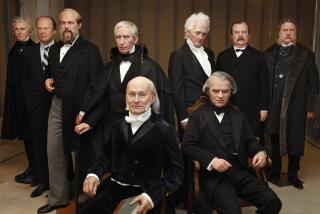Magisterial ‘Wilson’ explains why the 28th president is ignored
- Share via
When historians are asked to name our greatest president, Woodrow Wilson is consistently ranked near the top. He was president during the Progressive Era and championed many of its reforms, including the eight-hour workday, a federal income tax and government regulation of big business.
But Wilson is not beloved in the American imagination. His legislative achievements were a precursor to the New Deal, the New Frontier and the Great Society, but Democrats have never added him to their pantheon of 20th century heroes.
A. Scott Berg’s magisterial new biography makes it clear why. In “Wilson,” the 28th president of the United States is a complex and confounding figure. He’s a man of deep democratic principles whose prejudices lead him to work against one of the defining causes of his time — the struggle for racial equality. He is an eloquent scholar and brilliant thinker whose political talents fail him at critical moments, including the negotiations that created the shaky peace that followed World War I.
Above all, the Wilson of “Wilson” is a tragic figure. From his time as an ambitious professor at Princeton University to his two terms as president, he is literally working himself to death, until he’s finally left bedridden and helpless.
Following an exhausting cross-country campaign in support of American entry into the League of Nations (a precursor to the U.N. and a Wilson brainchild), Wilson suffered a massive stroke in October 1919. His wife, doctor and secretary conspired to keep the truth of his incapacity from the American people. Edith Wilson, the president’s second wife, became the de facto chief of state for several months.
The domestic drama of Mrs. Wilson’s “petticoat government,” as a Wilson foe described it, is one of several compelling episodes recounted with great detail and flair by Berg, the Southern California-based author of several outstanding biographies, including “Lindbergh,” which won the Pulitzer Prize.
Wilson’s eventful life could have merited the kind of multivolume work that Robert A. Caro is dedicating to Lyndon Johnson, but Berg has squeezed Thomas Woodrow Wilson into a single, 800-plus page book that manages to be at once intimate, sweeping and authoritative.
Young “Tommy” grew up in the South. His earliest childhood memory, according to “Wilson,” was of being almost 4 years old in 1860 and standing on his father’s porch in Augusta, Ga., hearing a passerby say “that Mr. Lincoln was elected and there was to be war.”
Wilson’s father was an Ohio-born Presbyterian minister, and Wilson grew up with a Southern identity tinged with Midwestern ideas about humility and public service. The senior Wilson also passed on to his son an overriding ambition. As a young man, and then as a college professor, the future president first acted out those ambitions in an entirely academic arena.
Wilson was our first history-geek president. His earliest hint of nationwide fame came entirely from his writing: He penned a popular multivolume history of the United States. Fame as an author, and his popularity as a professor, helped lead to his being appointed president of his alma mater, Princeton. Wilson advocated for reforms that would create more opportunities for the non-wealthy at Princeton, an agenda that drew the attention of Democratic Party kingmakers.
Like Barack Obama almost a century later, Wilson was catapulted to fame by a Democratic Party looking for “a fresh face with an unorthodox background.” The New Jersey political bosses who urged him to run for governor in that state thought he would be their “puppet.” Wilson proved not to be.
Once elected, Wilson easily outmaneuvered those bosses with a series of bold acts and statements Berg describes with page-turning energy. “After dealing with college politicians, I find these men with whom I am now dealing seem like amateurs,” Wilson said.
Wilson quickly shepherded a stunning series of political and labor reforms through the state legislature that made him a national hero to Progressives. He had been governor for less than a year when he was nominated to the presidency, following a dramatic, 46-ballot convention. It was one of the most meteoric political rises in American history.
“Wilson’s allure tended to sneak up on people,” Berg writes. Just when his opponents dismissed him as too cold and professorial to win over the average American, he managed to exude just enough warmth and humanity to convince voters otherwise. He easily defeated Teddy Roosevelt and incumbent William Howard Taft in the 1912 election.
Aided by large Democratic majorities in both houses of Congress, President Wilson transformed an important chunk of the Progressive wish list into law. But he also instituted racial segregation in the Post Office (then the nation’s largest employer) and other branches of the Civil Service.
After the war, expressing in private his fears that returning African American troops would upset the country’s racial order, Wilson “revealed his true unreconstituted nature, what could only be perceived as genteel racism,” Berg writes. In a similar vein, Wilson worked to undermine the efforts of radical suffrage activists. And he allowed his efforts to bring a just peace to the post-war world to be undermined by European leaders who knew the U.S. president would consent to just about anything they wanted if they agreed to join the League of Nations, Wilson’s signature project.
At times, and especially in its early chapters, Berg can sound a bit too wide-eyed about his subject. But in the end, his portrait of Wilson feels fair and fully textured. In “Wilson,” our 28th president emerges as a man who tried to change the course of history, only to see the forces arrayed against him destroy his health while he was still in office and undermine his legacy in the century that followed his departure from the White House.
Wilson
A Scott Berg
Putnam: 842 pp., $40
More to Read
Sign up for our Book Club newsletter
Get the latest news, events and more from the Los Angeles Times Book Club, and help us get L.A. reading and talking.
You may occasionally receive promotional content from the Los Angeles Times.











